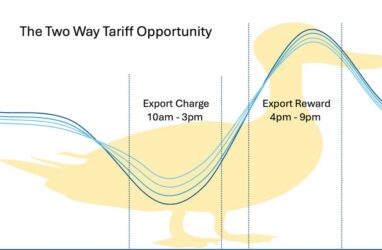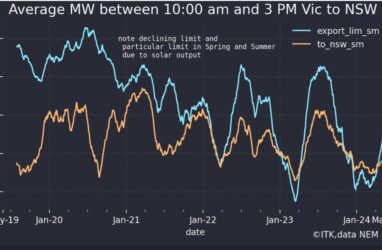Feed aggregator
Eraring deal: A smarter way to keep prices down would be to build more wind and solar
The post Eraring deal: A smarter way to keep prices down would be to build more wind and solar appeared first on RenewEconomy.
Ealing beavers: Dams, canals - and perhaps babies
Replanting trees can help prevent devastating landslides like the one in PNG – but it’s not a silver bullet
German energy giant presses go on Australia’s first eight-hour big battery
 Green light given for Australia's first eight-hour big battery, with Tesla to supply the technology.
Green light given for Australia's first eight-hour big battery, with Tesla to supply the technology.
The post German energy giant presses go on Australia’s first eight-hour big battery appeared first on RenewEconomy.
Changing native vegetation laws to allow burning on private land is good fire management
Symmetry and simplicity lost as networks impose “sun tax” on solar exports
The post Symmetry and simplicity lost as networks impose “sun tax” on solar exports appeared first on RenewEconomy.
No Tory MPs voted positively on climate issues since party took power, study finds
Labour and Liberal Democrats dominated list of MPs who were rated as very good in backing environmental policies
No elected Tory MPs have been rated as voting positively on climate issues, under a survey of parliamentary voting patterns since the Conservatives took power in 2010.
Only a single sitting Conservative was rated as “good” on climate votes in the ranking, but that was Lisa Cameron, the MP for East Kilbride, who defected from the Scottish National Party in October.
Continue reading...Clean steam age: Solar thermal can be an economic lifeline for coal and gas regions
The post Clean steam age: Solar thermal can be an economic lifeline for coal and gas regions appeared first on RenewEconomy.
Rethinking roads as public spaces – what NZ cities can learn from Barcelona’s ‘superblock’ urban design
Tasmania launches consultation on state’s first REZ in “windy north west”
 Tasmania launches six weeks of consultation on the final design of its first renewable energy zone.
Tasmania launches six weeks of consultation on the final design of its first renewable energy zone.
The post Tasmania launches consultation on state’s first REZ in “windy north west” appeared first on RenewEconomy.
Salmon v skate: environmentalists take fish fight to Tanya Plibersek’s door
Campaigners urge Australians not to buy Tasmanian farmed salmon to avoid ‘extinction event’ for Maugean skate
- Follow our Australia news live blog for latest updates
- Get our morning and afternoon news emails, free app or daily news podcast
Campaigners working to save the critically endangered Maugean skate – a ray-like fish species found only on Tasmania’s west coast – have brought the battle to the door of the environment minister, Tanya Plibersek, in inner-city Sydney.
Continue reading...Project developer secures funding for large ARR project in South Africa
Canadian oil and gas emissions intensity down 34%, GDP takes C$247 bln hit by 2035 from stringent emissions cap –report
Zen Energy breaks ground on its first big battery project
 Zen Energy has broken ground on its first big battery project.
Zen Energy has broken ground on its first big battery project.
The post Zen Energy breaks ground on its first big battery project appeared first on RenewEconomy.
Tackling water shortages with 'Star Wars' tech
More economic growth when carbon tax revenues spent publicly instead of privately -study
US Policy Roundup: Illinois advances regulation of carbon capture and storage
Women’s wellbeing at risk due to climate inaction with EU political shift, say advocates
More transmission please, the planners forgot about solar
The post More transmission please, the planners forgot about solar appeared first on RenewEconomy.
Threatened species and chips? Other fish frequently sold as flake, Australian study finds
Scalloped hammerhead and greeneye spurdog among at-risk shark discovered in genetic testing of fillets
- Follow our Australia news live blog for latest updates
- Get our morning and afternoon news emails, free app or daily news podcast
One in 10 fillets of shark meat bought by Australians at fish and chip shops and markets – often labelled as flake – is from a threatened species, according to a study that has uncovered widespread mislabelling of shark sold to the public.
Nine of 91 fillets were found to be either scalloped hammerhead, greeneye spurdog or school shark – all considered threatened in Australia – after scientists at Macquarie University used DNA analysis to check what they were sold.
Continue reading...






